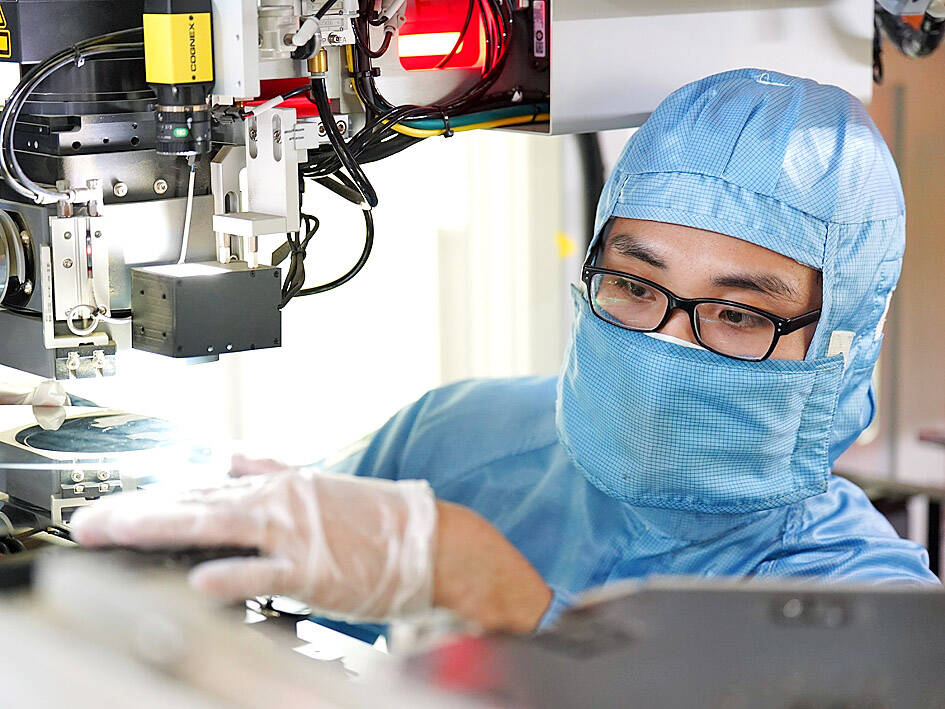The climate gauge for the nation’s manufacturing sector in September remained “yellow-blue” for the seventh consecutive month, as major economic barometers such as exports, export orders and industrial output took a hit from global economic woes, the Taiwan Institute of Economic Research (TIER, 台灣經濟研究院) said yesterday.
The TIER business composite index posted 10.53, down 0.62 points from a month earlier, as demand, raw material input, operating conditions and cost measures all posted negative cyclical movements, TIER said.
The Taipei-based institute attributed the general downtrend to stubbornly high global inflation that prompted drastic monetary tightening by major central banks, weakening demand for Taiwan’s exports.

Photo courtesy of the Ministry of Education
China’s tight COVID-19 restrictions and the military conflict between Russia and Ukraine suppressed economic activity and slowed inventory adjustments, it said.
The pace of retreat is therefore most evident from the demand perspective, followed by raw material input, the operating environment and the cost factor, the institute said, adding that the index is leaning closer to a “blue” reading which signifies a recession.
Though the release of Apple Inc’s new iPhone series helped support local chipmakers and suppliers of memory chips and other electronic devices, the nation’s industrial production slipped into contraction in September, ending 34 months of gains, the institute said.
The climate reading for the electronics sector, the main export driver, remained trapped in a listless state, as major tech firms gave guidance that inventory corrections would persist until the second half of next year, it said.
Non-tech sectors were equally gloomy. Manufacturers involved in the supply of paper, cotton and textile products said demand in US and European markets tumbled amid high inflation, although domestic business showed improvement after the government relaxed its COVID-19 measures.
Makers of petrochemical and plastic products saw output shrink by double percentage points due to declines in business and profit margins, the institute said, adding that some firms opted to conduct annual maintenance to cope with the downward cycle.
Makers of plastic products were grappling with dwindling demand for personal protective equipment and anti-COVID-19 products, as the world emerged from lockdowns, the institute said.
The yellow-blue reading also affected auto parts suppliers in September, when the number of new license plates dropped 12 percent, the institute said.
Companies in the sector benefited from an increase in demand and input readings, but overall vehicle sales remained constrained by chip shortages, it said.

US sports leagues rushed to get in on the multi-billion US dollar bonanza of legalized betting, but the arrest of an National Basketball Association (NBA) coach and player in two sprawling US federal investigations show the potential cost of partnering with the gambling industry. Portland Trail Blazers coach Chauncey Billups, a former Detroit Pistons star and an NBA Hall of Famer, was arrested for his alleged role in rigged illegal poker games that prosecutors say were tied to Mafia crime families. Miami Heat guard Terry Rozier was charged with manipulating his play for the benefit of bettors and former NBA player and

The DBS Foundation yesterday announced the launch of two flagship programs, “Silver Motion” and “Happier Caregiver, Healthier Seniors,” in partnership with CCILU Ltd, Hondao Senior Citizens’ Welfare Foundation and the Garden of Hope Foundation to help Taiwan face the challenges of a rapidly aging population. The foundation said it would invest S$4.91 million (US$3.8 million) over three years to foster inclusion and resilience in an aging society. “Aging may bring challenges, but it also brings opportunities. With many Asian markets rapidly becoming super-aged, the DBS Foundation is working with a regional ecosystem of like-minded partners across the private, public and people sectors

BREAKTHROUGH TECH: Powertech expects its fan-out PLP system to become mainstream, saying it can offer three-times greater production throughput Chip packaging service provider Powertech Technology Inc (力成科技) plans to more than double its capital expenditures next year to more than NT$40 billion (US$1.31 billion) as demand for its new panel-level packaging (PLP) technology, primarily used in chips for artificial intelligence (AI) applications, has greatly exceeded what it can supply. A significant portion of the budget, about US$1 billion, would be earmarked for fan-out PLP technology, Powertech told investors yesterday. Its heavy investment in fan-out PLP technology over the past 10 years is expected to bear fruit in 2027 after the technology enters volume production, it said, adding that the tech would

YEAR-END BOOST: The holiday shopping season in the US and Europe, combined with rising demand for AI applications, is expected to drive exports to a new high, the NDC said Taiwan’s business climate monitor improved last month, transitioning from steady growth for the first time in five months, as robust global demand for artificial intelligence (AI) products and new iPhone shipments boosted exports and corporate sales, the National Development Council (NDC) said yesterday. The council uses a five-color system to measure the nation’s economic state, with “green” indicating steady growth, “red” suggesting a boom and “blue” reflecting a recession. “Yellow-red” and “yellow-blue” suggest a transition to a stronger or weaker condition. The total score of the monitor’s composite index rose to 35 points from a revised 31 in August, ending a four-month